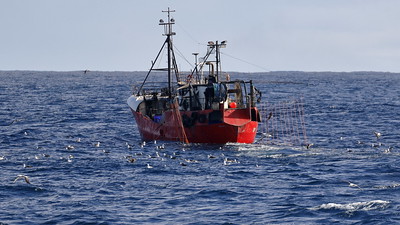Guvernul britanic considera fermierii si pescarii britanici o problema, deoarece sunt industrii care produc foarte putin, la preturi ridicate si nu ofera locuri de munca pentru bastinasi. Majoritatea ţăranilor si pescarilor britanici au votat pentru Brexit. Pescarii spera ca prin iesirea Marii Britanii din UE, vasele de pescuit europene vor pierde dreptul de a pescui in apele britanice, desi licentele de pescuit sunt vandute la olandezi, francezi sau flotelor europene de pescuit de catre pescarii britanici, iar pestele prins, este vandut in Europa, deoarece britanicii consuma doar specii de peste precum cod.
Industria pescuitului este o parte minusculă a economiei Regatului Unit – în valoare de mai puțin de 0,1% din totalul PIB al anului 2018 – dar a devenit o problema pentru o Britanie globala, independentă,eliberată de restricțiilor impuse asupra ei și de reglementărilor stabilite de tari precum Germania si Franta sau Uniunea Europeana. Asta e varianta oficiala oferita de catre guvernul britanic, un guvern condus de catre Alexander Boris de Pfeffel Johnson, un individ dubios care a inventat legenda bananei strambe , in timp de ce lucra ca jurnalist pentru Daily Telegraph, de unde a fost concediat, pentru ca mintea, si apoi reangajat si facut Premier de catre ziarele de drepta (Daily Mail, Daily Telegraph, The Sun).
Cotele de pescuit sunt stabilite pentru speciile de pește prins în Bruxelles, în fiecare an, după sfaturi științifice avand in vedere nivelurile de stocuri și sunt alocate statelor membre UE pe baza pescuitului practicat de tara respectiva. În prezent, bărcile de pescuit din UE au dreptul la peste 60% din debarcările totale (peste prins si declarat) în greutate din apele care apartin de Marea Britanie, iar pentru unele specii, proporția este mai mare.
De exemplu, Regatului Unit i se alocă 9% din specia cod prins in Canalul Manecii sau English Channel, în timp ce francezii obțin 84%. Începând cu anul viitor, acțiunile de cote vor fi negociate și nu decise la Bruxelles.
Prin urmare, pescuitul se bazează mult pe discuțiile comerciale care urmează să înceapă la începutul lunii martie. Potrivit lui Nigel Farage, pescuitul va fi „testul acid” al Brexit-ului.
Newlyn is Cornwall’s biggest fishing port. The harbour is home to over 100 boats, and for generations fishermen from here have sold fish in the town’s busy market. Not much has changed around here for nearly 100 years – until now. Brexit is coming and as the town prepares to navigate these uncharted waters, one man is at the helm – harbour master Rob Parsons. He has been in post for five years but is still regarded as the new harbour master. Rob oversees every aspect of the daily running of the harbour, from the quayside to the market.
The harbour is managed by Rob and a board of commissioners on behalf of the stakeholders, mainly fishermen and related industries. He has already overseen a £1.3 million redevelopment of the town’s fish market, but with Britain about to leave the European Union, Rob wants to make sure the harbour is ready to take advantage of any opportunity Brexit may bring. And he is using EU money to help him do so.
The market is only the first step in Rob’s vision for a new Newlyn. There are plans in place to redevelop an area of the port and revitalise the harbour’s ageing infrastructure, but change doesn’t always come easy and not everyone is happy about the proposed plans. Many fishermen are angry at the way things have been handled, feeling they have not been consulted on the future of their harbour. As tensions begin to rise, Rob finds himself facing some difficult conversations.
There are other changes rumoured to be taking place on Newlyn’s fish market. For decades, the daily fish auction has been run by local family firm WS Stevenson & Sons, a name synonymous with Newlyn. Word on the market floor though is that the harbour may be looking to introduce a second auctioneer, a rival firm from Devon.
While rumours spread and tensions rise in Newlyn, the whole of the UK is in the midst of Brexit turmoil. Many fishermen think Brexit will bring a brighter future for their industry and now they want MPs to deliver on the promises made during the referendum to take back control over British waters and quotas. As the deadline draws closer and negotiations intensify, fishermen fear that their industry may be sacrificed, but Newlyn men continue to make their voices heard.
https://www.bbc.co.uk/iplayer/episode/m000fjsh/cornwall-this-fishing-life-series-1-episode-6


